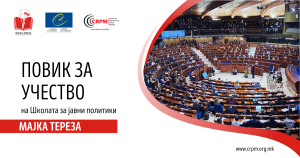The research within the project: The adaptation of Industrial Relations toward New Forms of Work, includes quantitative and qualitative methods for collecting and processing data. In order to better assess the situation regarding these issues, we used primary and secondary data sources. Secondary sources were prior analysis and reports on the topic, but it is important to note that analysis of secondary sources was extremely limited. Therefore, most of our analysis and conclusions are based on our findings from the research conducted for purposes of this study. Primary statistical sources were data obtained from our field survey. Additionally, we used statistical data available at the State Statistical Office (SSO) and the Ministry of Information Society and Administration (MISA).
In compliance with the Law on Free Access to Information of Public Character which provides for this, CRPM sent out forms requesting access to information of public character to 34 public (state) and private institutions, agencies and economic chambers. The mandate and competencies of the different institutions and agencies we approached determined the volume and type of statistics that we requested. Bearing in mind that the effects of digitalization and new forms of employment on industrial relations in Macedonia are still not sufficiently recognizable and researched, it was difficult to obtain relevant statistical data, since the institutions from which data were requested do not have the indicators and benchmarks for the new forms of employment.





